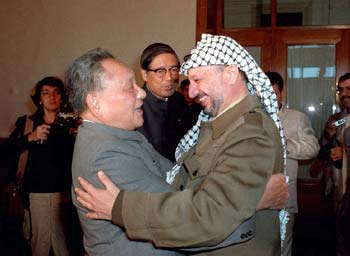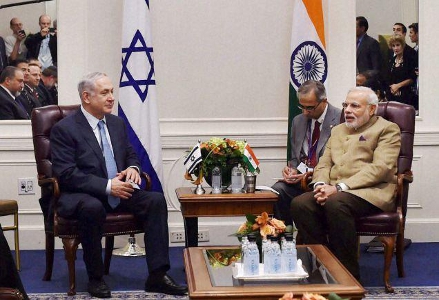The most recent conflict between Israel and Gaza spurred on analysis regarding the extent of its regional impact. The crisis has undoubtedly had repercussions on the neighboring states and on Middle Eastern geopolitics in general, but one could also perceive the escalation from a Chinese and Indian perspective. Both governments struggled to project a neutral stance in the conflict overall, so as to avoid upsetting their strategic relations with Israel, whilst simultaneously facing external and domestic pressure to take a moral stance worthy of the nations’ ambitions as rising global powers. Such pressures also stem from America’s pivot towards Asia and its increasingly independent energy sector, developments which have caused speculation as to which states might replace it as a foreign mediatory power. Whilst the notion of having such foreign states involved in the region is controversial, it has nevertheless been a prevalent theme in contemporary history, and might continue being so in response to developments in Iraq and Syria. Yet both the Chinese and Indian governments continue to be preoccupied with preserving their national interests than contributing to potentially troublesome international mediation efforts.
Indian and Chinese involvement in the Palestinian question
India and China have been involved in Palestine for a number of decades nonetheless. The region might seem distant and inconsequential to the nationalist government of India and the politically non-interventionist Communist Party of China, but it does attract governmental interest. The Arab countries’ abundant oil resources are obviously economically significant, and Israel has become an integral partner for the two states in economic cooperation and arms trade. A balancing act has thus become necessary for both China and India in recent years. But the countries’ ambitions to remain neutral have not always prevailed.
From Mao to Deng
During the rule of Chairman Mao Zedong, China was openly pro-Palestinian and regarded the former PLO-leader Yasser Arafat as a close friend of the Party. This was a consequence of Mao’s political calculations and ambition to support a state that challenged Israel, America’s close ally. Yet following Deng Xiaoping’s desire to increase the economic strength of the country in the late 1970s and ’80s, China gradually became less conspicuously involved in the Arab-Israeli question in order to benefit from the advanced Israeli defense industry. This shift in China’s approach to Middle Eastern affairs was predominantly driven by economic and military interests, rather than political ones. Diplomatic relations between Israel and China were only established in 1992, despite the former state being the first country in the region to recognize the People’s Republic of China as a nation-state.

Yasser Arafat and Deng Xiaoping meet in 1981. (Photo: Xinhua).
India – from non-alignment to ally
1992 also marked the year Indo-Israeli diplomatic ties were established, despite a bilateral relationship that spanned several decades in fields such as counter-terrorism and defense. India had been the recipient of Israeli intelligence gathering, cooperated with Israel in military exercises and was given weaponry during its territorial disputes with China in 1962, and Pakistan in 1965 and 1999. But a political relationship did not flourish due to ideological differences. India, alongside China, was one of the key founders of the Non-Aligned Movement and made a closer relationship with Israel problematic after its military struggles with Egypt in 1967 and 1973, another member of the Movement. The electoral victory of Narendra Modi, however, means that the two states are more likely to develop a closer partnership that extends beyond the strategically orientated one that is in place today. This is because both the administrations of Benjamin Netanyahu and Modi are right-wing with nationalist tendencies, in contrast to the former left-wing government of Manmohan Singh.

Prime Minister Benjamin Netanyahu and Prime Minister Narendra Modi meet in New York in 2014. (Photo: Reuters)
Divergence between state and citizens
The key challenge, both during the conflict and for future international crises, comes in the shape of harmonizing the increasingly polarized opinions of the Chinese and Indian public with the interests of each government, as well as aforementioned overseas responsibilities. The Indian government only made one official press release regarding the conflict, where it urged restraint on both sides. This can be juxtaposed with the several public Gaza solidarity marches that occurred, demonstrations which propagated a more active condemnation of Israel, and which would subsequently be commensurate with the anti-colonial history of contemporary India.
A similar divergence of opinion between the state and its citizens continues to be prevalent in China. The country’s ’netizens’ used social media to debate both for and against the actions of Israel and Gaza. Domestic opinion was divided between predominantly Muslims and non-Muslims, but there is also a relatively small group of people who place themselves between these two polar opposites. Arguments ranged from purporting the right of national self-defense, to aiming to display solidarity with the Gaza inhabitants.
It is arguable that the floundering attempts of China and India to project an image of neutrality represents the de-ideologization of their Middle East presence. This is a noteworthy and clearly needed step in a region overwhelmed by sectarian and ideological dispute, yet becomes problematic when it results in political passivity. Quiescent Chinese and Indian foreign policies originate in their ambition to maintain their lucrative Middle Eastern presence, whilst simultaneously trying to avoid burdening themselves with the international responsibility that accompanies it. Such self-centered policies are not only counterproductive for their own ambitions as rising powers, but further curtail the potential benefits which diverse international actors may bring to the conflict.
